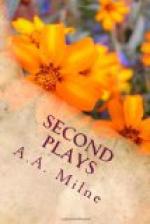again before we started, because I hadn’t got
the right pair of shoes on—rather a tight
pair—however, I put them on. And there
was a hansom outside the hall, and it was our last
dance together, and he said, “Shall we sit it
out, Miss Bagot?” Well, of course, I was only
too glad to, and we sat it out in the hansom, driving
all round Surbiton, and what your grandmother would
have said I don’t know, but, of course, I never
told her. And when we got home after the dance,
I went up to her room—as soon as I’d
got my shoes off—and said, “Mother,
I have some wonderful news for you,” and she
said, “
Not Mr. Knowle—Henry?”
and I said, “’M,” rather bright-eyed
you know, and wanting to cry. And she said, “Oh,
my darling child!” and—Jane, where’s
my handkerchief? (It has dropped off the sofa and JANE
picks it up) Thank you, dear. (She dabs her eyes)
Well, that’s really all, you know, except that—(she
dabs her eyes again)—I’m afraid I’m
feeling rather overcome. I’m sure Dr. Anderson
would say it was very bad for me to feel overcome.
Your poor dear grandmother. Jane, dear, why did
you ask me to tell you all this? I must go away
and compose myself before your uncle and Mr. Coote
come in. I don’t know what I should do
if Mr. Coote saw me like this. (She begins to get up)
And after calling me a Spartan Mother only yesterday,
because I said that if any nice, steady young man
came along and took my own dear little girl away from
me, I should bear the terrible wrench in silence rather
than cause either of them a moment’s remorse.
(She is up now) There!
JANE. Shall I come with you?
MRS. KNOWLE. No, dear, not just now. Let
me be by myself for a little. (She turns back
suddenly at the door) Oh! Perhaps later on, when
the men come from the dining-room, dear Jane, you
might join me, with your Uncle Henry—if
the opportunity occurs. . . . But only if it occurs,
of course.
[She goes.
JANE (coming back to the sofa). Poor Aunt Mary!
It always seems so queer that one’s mother and
aunts and people should have had their romances too.
MELISANDE. Do you call that romance, Jane?
Tennis and subscription dances and wearing tight shoes?
JANE (awkwardly). Well, no, darling, not romance
of course, but you know what I mean.
MELISANDE. Just think of the commonplace little
story which mother has just told us, and compare it
with any of the love-stories of history. Isn’t
it pitiful, Jane, that people should be satisfied now
with so little?
JANE. Yes, darling, very, very sad, but I don’t
think Aunt Mary—
MELISANDE. I am not blaming Mother. It is
the same almost everywhere nowadays. There is
no romance left.
JANE. No, darling. Of course, I am not romantic
like you, but I do agree with you. It is very
sad. Somehow there is no—(she searches
for the right word)—no romance left.
MELISANDE. Just think of the average marriage.
It makes one shudder.




